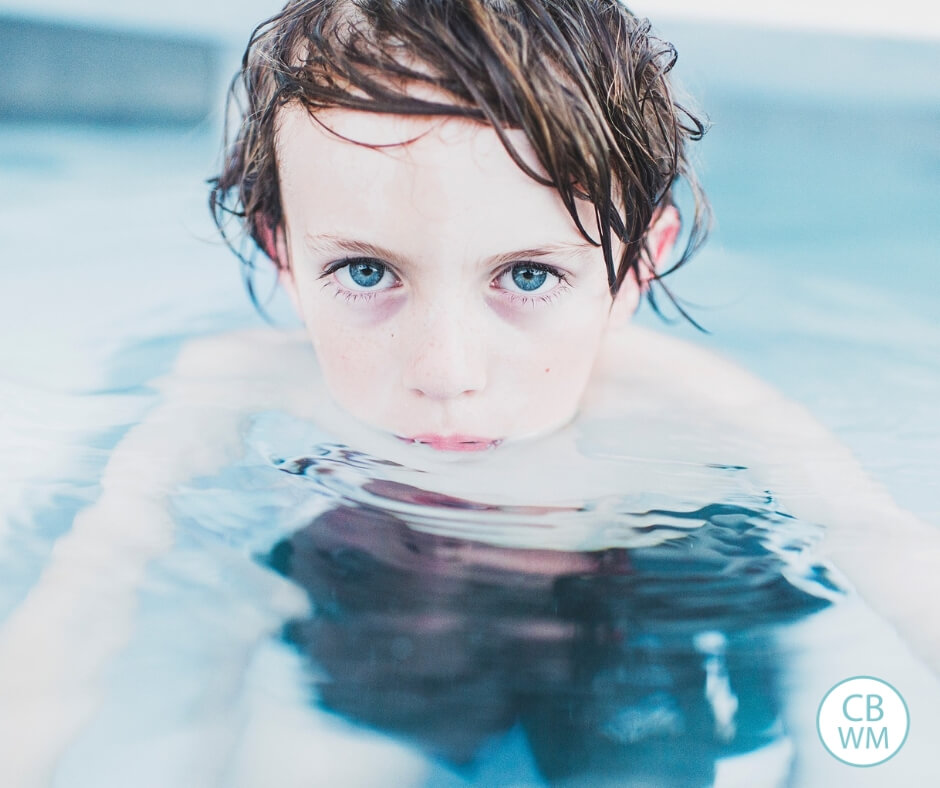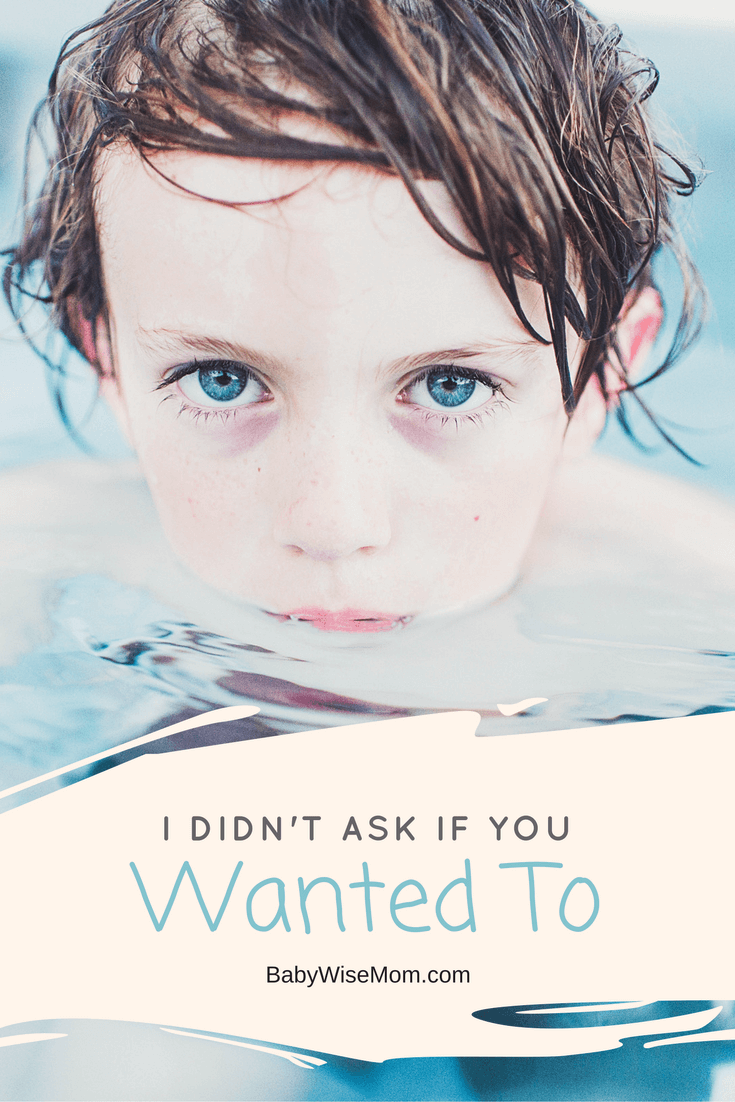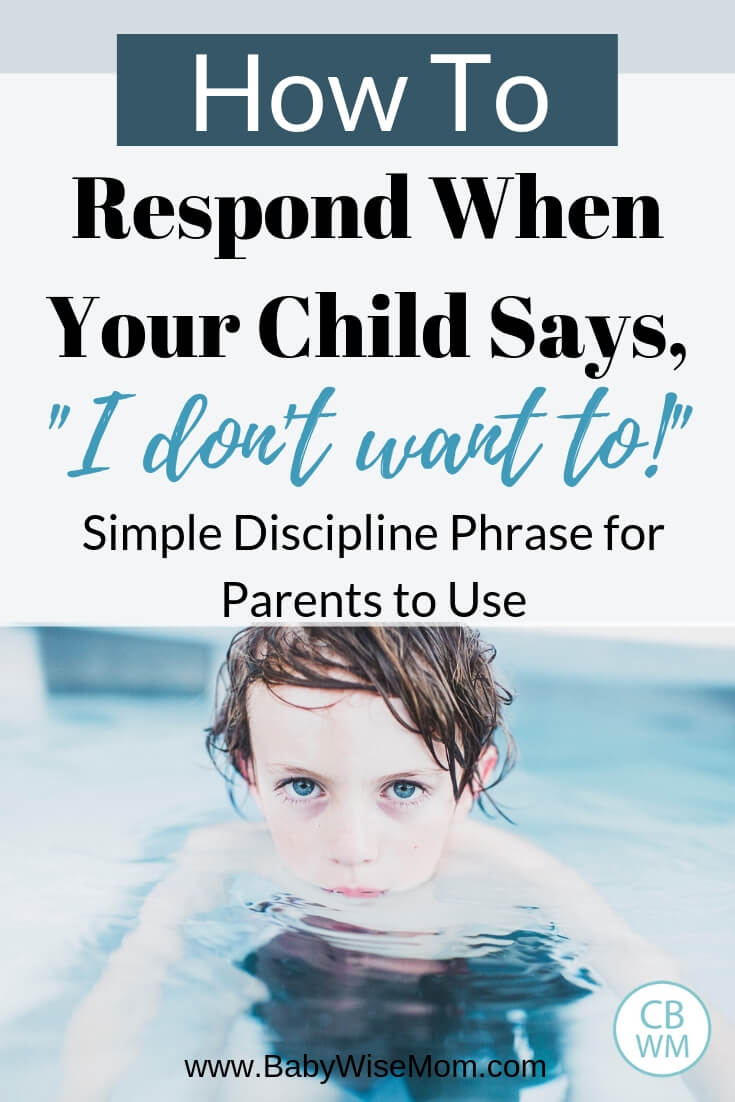How to respond when your child tells you he doesn’t want to do what you have instructed him to do. Respond without anger or yelling.

I find it really helpful to have little phrases that I use to respond to situations in parenting. If a child whines, I like to be able to have a phrase I know I am going to say in response. It helps me stay cool and calm in the moment and over time, the child figures out that the whining does not help.
This is true for many different discipline issues. I have a post full of my favorite discipline phrases here.
Discipline will be much more effective if you have a plan in place. A plan means you have consistency. Consistency means your child learns what is okay and what is not. Children constantly test boundaries and when a boundary stays in the same place, they learn what is a yes and what is a no. It helps sest them up to be succesful when they try to obey and make good choices.
Conversely, when things are not consistent, the child isn’t sure what is okay and what is not. If some days your child says “I don’t want to” and you say, “Okay never mind” while other days you say, “Go to timeout,” your child will be very confused and unsure of how to respond when he doesn’t want to do something.
Discipline Phrase
My children are, generally speaking, quite well-behaved. Yes, they have their moments. Yes, they test their limits. But overall, they are very obedient. We go days between need for any sort of correction at all.
Many years ago, I paid attention to our days to see what things I did that seem to help. I realized the positive impact of consistency and noticed it was easier to be consistent when I had a plan on how to respond to situations. One tactic I used (and still use) is the phrase, “I didn’t ask if you wanted to…”
I have to try to explain a bit about my personality. I am very calm. My sense of humor is very dry; when I am making a joke, you really have to know me to be sure if I am serious or joking. I have excellent control over my emotions. I am extremely matter-of-fact. I am logical.
When I discipline my children, I strive to be calm about it. I do not raise my voice or get emotional. My Mom has marveled at my patience–I suppose I wasn’t as patient as the child as I am as the parent :). I do not try to put any guilt upon my children. I don’t hold grudges. I just say it like it is, correct as necessary, and we move on.
For some reason, Brayden as a four year old really disliked going potty. The child could hold it in forever. I could count on one hand the number of times he had to go potty at a time other than when I told him to. It seemed he viewed the bathroom as a major inconvenience in his life. This isn’t a problem accident-wise. You just have to go, you know?
My phrase “I didn’t ask if you wanted to…” started with the potty.
“Brayden, you need to go potty.”
“I don’t want to go potty!”
“I didn’t ask if you wanted to; I just said to go.”
End of conversation. He would go. This became a phrase I would use for any situation my children protested because they didn’t want to.

Whenever I instruct them to do something and they feel the need to tell me they don’t want to, I remind them that I didn’t ask if they wanted to, just that I told them that they needed to.
When I say this, my emotions are even. I am not frustrated or exacerbated. I am not angry. I am not condescending. I am really quite nonchalant. I am just letting the child know the reality of the matter. It is just information to remind them who decides. Mom decides 🙂
A similar phrase I might use interchangeably is “I know you don’t want to, but you need to.” I use this with the same tone, same situations, and same demeanor.
This can be handy when it time to leave the park, eat dinner, clean up toys, or turn on the television.
Conclusion
If you find yourself correcting your child or children over and over again on the same thing, try having a phrase you use to respond to it that is no-nonsense. Be super consistent in how you respond and what you expect from your child. You will be surprised at how much a little phrase can positive impact your child’s behavior.
Related Discipline Posts:
These are some helpful discipline posts:


Loved this post! And love that you have a self proclaimed dry sense of humor, I do as well 🙂
I use this phrase all the time when teaching (high school). It gets the point across without having to be the jerk teacher. I think that by having a baby I’m a better teacher, and by being a teacher I’m a better mother.
I don’t think you can follow Baby Wise and not be a logical person. The whole system was written for logical-type parents… 🙂
Excellent. I’ll have to remember this one!
That’s a good one. I’m ALWAYS saying, “do you understand?” Anytime I give an instruction, I’ll ask him this. And he promptly answers “yes, mommy” 100% of the time! It works wonders.
What a great reminder of how to be in control but not controlling!
I really needed this post today. He didn’t want to do alot!
Like Jamie, I used this all the time teaching jr high. That nonchalant response was always the way to go to keep them from even attempting arguing/talking back. Just state the directive and move on; the expection of obedience is naturally implied.
My daughter (8) was just like Brayden when she was young in the sense that she would never initiate going to the bathroom on her own. She actually ended up with some UTIs when she was young. They were due to a combination of holding it and a bladder reflux problem (she was on antibiotics for over a year to prevent UTIs). I didn’t have the luxury of being a SAHM when she was young, so I always had to ask the daycare provider to remind her many times a day to use the bathroom. She had problems in preschool, K, and 1st grade with never using the bathroom during the day at school! I would have to ask her daily if she was using the bathroom at school and troubleshoot the matter with teachers!
I think the magic to your method is staying calm and being matter-of-fact. I am the opposite of you when it comes to control over emotions. I get frustrated so easy and have a hard time staying calm? Any tips on how you do it? I really think this undermines my authority and may be why I’m having such a hard time getting anything to work.
I do this too, but I say “You don’t have to want to, you just have to obey.”
I would defenitely remember this one. Thank you for ypur blog once again. You are so good in everything you do. The only thing I’ve ever got right is feedings.I wonder if someone canhelp. See I am one of those babywise moms that expect things to be perfect, but it never is:) Since my LO was 6 weeks old it has been a rollercoaster.I get everything perfect then it falls apart then I get it perfect again then it falls apart again.a view week ago I got thetime for my Lo to go down for her naps perfect, and she actually slept for 1.5 – 2 hours. It went like this for 4 days then all of a sudden 45min naps again constantly. I’ll get a lucky day when she would sleep an hour. In the mornings I put her in her crib and then she falls asleep, after 10min for some reasons she is awake and playing- she would fall asleep after 20-30min after that, Just to wake 45min later.After that I do ajust the time for her to go down for her second nap. But over the past few months I have realized that if her morning nap is a mess her whole day is a mess no matter what I do.I never get anything done at home, ’cause as soon as I start something she is awake again. The only time I get to clean is after 8 in the evening. I feel like I’m missing something. I did try to just go with her short naps, but it backfired, if I do that I have a very, very unhappy baby that cries the whole time. Can anyone please give me some advise – if not just some words of encouragement.
I wish I was able to stay nice and calm all the time. It’s so hard to do! Great advice BTW. I’ll definitely be using this.
Thanks Christie!
Thanks Jamie! It seems many tips and tricks for teaching work well for parenting, too.
Very true, Val. Most of us fall into a certain mold.
Thanks Rachel!
Good idea Maureen. Do you understand is a good phrase to use.
True Nikki. It is tricky to not be controlling!
lol Marci. Those days come 🙂
Thanks Becca. It is amazing how well this phrase works. I will have to be sure to carry it on up through the teenage years 🙂
That is too bad Jeannie! Luckily we haven’t had UTI problems. He will initiate if he really needs to go, but he can sure hold it forever!
Kristin,I think that is right; you have to control your emotions. I was less patient when I was pregnant, and I could see an immediate difference in behavior when I was emotional. My disposition is naturally just “chill.” It isn’t a struggle for me (most of the time) to remain calm, so I don’t really have any good tips unfortunately. Try to find things that can help you. Try to remember that your child isn’t necessarily trying to irritate you. Also, children are going to be disobedient. It is part of life. Just expect it and accept it. Adults do things they shouldn’t often, why would children be any different? Good luck!
Good one, Allison.
C-lee, it takes time to get things down :)One thing to realize is that it is normal to have disruptions. Things are always changing with a baby, so you can’t do things the same way day in and out with a baby. You have to constantly change because baby is. That makes things hard :)I would keep a log of each day for sure if you aren’t already. Track waketime length, what she eats, what she does, nap lengths, etc. Then after some time you can evaluate the days to see if there is a common thread for days that are good and days that are bad. Be particulary vigilant with the first waketime period since the first nap is so importnat. You aren’t alone…a lot of people have nap problems for long periods of time.
Thank you, Well the good news is we have her morning nap down perfect she, now it is just time to figure out the afternoon naps. I wil and she jus got her first tooth 2 days ago. Thank you again for your advise 🙂 I’m actually starting to enjoy figuring her out rather than thinking there is no hope.
This sounds great. What do you do/say when they continue to whine or complain about what you told them to do? Or when they just don’t?
We had a few weeks of the flu in the house and it threw everything off. I was down for a week, and routines flew out the window. I have been struggling to get things back under control.
I would have a consequence of some sort. I would either set the timer and tell them they can try again when the timer dings (do two minutes) or have the child go to his/her room for a bit until they can talk without whining.